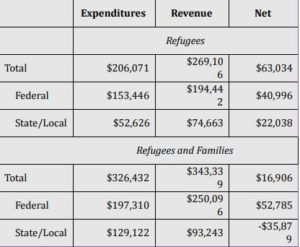All across the country, stories abound of communities that have been reshaped by refugees in recent decades. Such experiences highlight the very real—if underappreciated—way that refugees impact not only our society, but also the bottom lines of our main streets and local employers:
- In St. Louis, Missouri, residents credit Bosnian refugees with opening restaurants, buying vacant homes, and turning around a South City neighborhood once ridden with crime.
- In Minneapolis, Minnesota, Somali refugees have become such an integral part of the city’s business and cultural landscape that one now represents the area in the state house.
- In Louisville, Kentucky, factory owners say they likely would not be in business if not for the ambitious refugees who come to them seeking work.
Anyone who says that refugees and other immigrants are bad for the U.S. economy is spouting ignorant, xenophobic opinion, not fact. Here are hard numbers from a 2017 draft report from the Department of Health and Human Services:
- the net fiscal impact of refugees was positive over the ten year period, at $63.0 billion;
- they contributed more in revenue than they cost in expenditures;
- refugees net fiscal benefit to the federal government is estimated at $40.9 billion;
- the net fiscal benefit to state and local government was estimated at $22.0 billion.
 On a per capita basis, refugees contributed more than U.S.-born citizens during this period. The longer refugees stay in the U.S., the more enhanced are the benefits they bring to the economy.
On a per capita basis, refugees contributed more than U.S.-born citizens during this period. The longer refugees stay in the U.S., the more enhanced are the benefits they bring to the economy.
A key reason why refugees tend to flourish — despite being among the most vulnerable and destitute when they arrive — is the grit and determination they forged in the face of extreme adversity and persecution.
According to the New American Economy Research Fund, refugees are 50% more likely to become entrepreneurs than American citizens who were born in the U.S. Another study found that refugees in Columbus, Ohio, supported more than 21,000 jobs and contributed more than $1.6 billion to the local economy.
What’s more, refugees often pass along their drive and propensity for hard work to their children. The New American Economy Research Fund found that 40% of Fortune 500 companies were founded by refugees, immigrants or their children.
Klo and Nan Phyu Sin Thet Han say it’s their duty to do well for their families. “My parents said only education will make you go so far in life,” Thet Han said. “They say they only came to America because of my education. That’s the only motivation that we have. They put all their hopes and trusts and everything in me. So education becomes a responsibility for me. And not like a burden, but it’s something that I have to do. I knew that right away.”
In 2013 and 2015, more than half of the top 10 students at one high school in Utica, NY were refugees.
Featured photo courtesy of New American Economy.
See full Op-Ed by Tim Breene, CEO of World Relief, in the Los Angeles Times.
See article in Observer-Dispatch by Alissa Scott.

